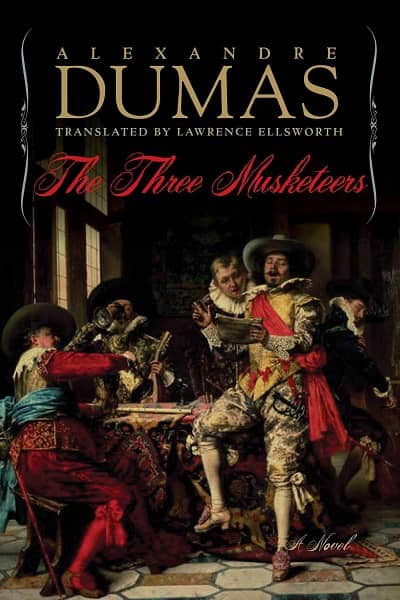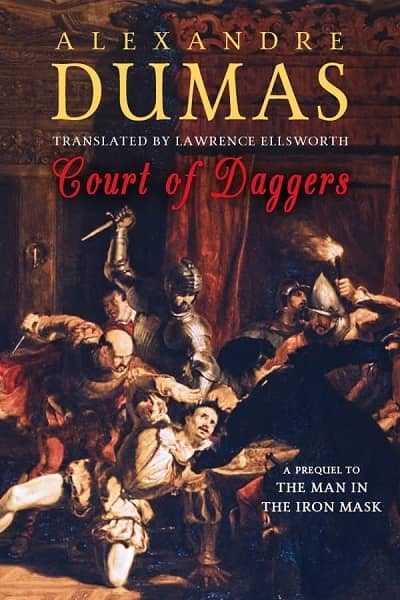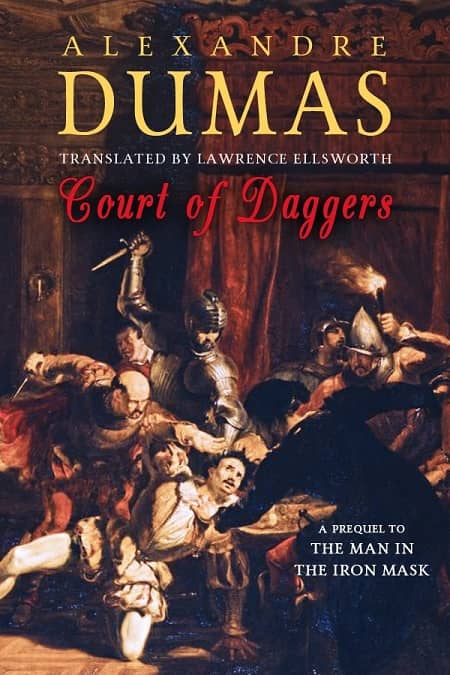Dumas’ Musketeers: Finding their Future in the Past
Court of Daggers by Alexandre Dumas,
translated by Lawrence Ellsworth (Substack, 2022)
Besides compiling the Cinema of Swords series, you might be aware of my other ongoing adventure fiction project, editing and translating new, modern editions of Alexandre Dumas’ Musketeers novels. This is an adventure in itself, as The Three Musketeers and its sequels amount to almost two million words in French, and the new English editions of the Musketeers Cycle will fill nine volumes when completed. Thus, it’s a big, multi-year project — and meanwhile the very shape of book publishing is shifting beneath our feet. But it’s shifting in ways you may find interesting, as the kind of genre fiction we celebrate here at Black Gate is even more susceptible to these changes than other literary forms.
The standard business of mainstream book publishing — at least, what seems standard because it’s what we grew up with — is under pressure from many different directions: cost of goods keeps increasing, which cuts into already slim profit margins, megacorp consolidation means fewer publishers and more homogeneity, and the internet, video games, and new digital platforms are all vying for the attention of an audience that is increasingly open to such new attractions.
 |
 |
 |
The Red Sphinx, The Three Musketeers, and Twenty Years After by Alexandre Dumas,
translated by Lawrence Ellsworth (Pegasus Books, 2017 – 2019)
Despite these prevailing headwinds, the new Musketeers Cycle managed to find a mainstream home with Pegasus Books, a small but robust New York publisher, starting with Dumas’ The Red Sphinx in 2017, a rediscovered novel that generated a good bit of interest with readers and retailers. We followed up with The Three Musketeers and Twenty Years After in handsome, illustrated editions that were well received — but then the Covid pandemic hit. The Musketeers books sold well to browsers in bookstores who liked their look and bought them on impulse, but when the bookstores closed during lockdown the browsers stayed home, and sales on the next two books, Blood Royal and Between Two Kings, were disappointing. With the series seemingly stalled, Pegasus declined to take a chance on book six, Court of Daggers.
That seemed to shut the door on further mainstream publishing for the Musketeers Cycle, because no orthodox publisher wants to jump in and pick up a series that was started elsewhere: they have no prior connection with that series’ readers, and even if the books did well, they wouldn’t have the earlier books on their backlist to profit from the series’ success. What to do?
Self-publishing was the most obvious alternative, and I’d done it before with other titles so I knew the routine: a trade paperback largely for promotional purposes, but lacking broad bookstore distribution the vast majority of sales would be in the ebook formats. Nowadays self-publishing, especially for niche titles, has lost most of the stigma it once had — but was that the right answer for the Musketeers Cycle?
I thought back to how Dumas had handled it when he wrote these classic tales in the mid-19th century. In those days, the standards and practices of what we now call mainstream publishing were in their infancy, and it was pretty much the Wild West, with all sorts of approaches being tried out — rather like now, in some ways. In fact, in the 1840s, when Dumas switched from play writing to prose fiction, the most popular way to read novels in France and Britain was in serial form, in chapters delivered in weekly journals and newspapers. All the early bestsellers by Alexandre Dumas and his great contemporary Charles Dickens originally appeared in periodicals, with the chapters later being collected and compiled into book form.
 |
 |
 |
Blood Royal, Between Two Kings, and Court of Daggers by Alexandre Dumas,
translated by Lawrence Ellsworth (Pegasus Books, 2020, 2021, and Substack, 2022)
Dumas’ original audience bought his works in periodical form at newsstands or paid subscriptions to have them delivered, and the periodical publishers split the income from the sales with the author — a viable alternative to book publishing. And interestingly, now that alternatives to mainstream publishing are once again appealing to readers, a digital form of the old periodical approach has newly arisen and is proving popular. It started in 2017 with Substack, an online subscription platform initially designed to support news writers, bloggers, and podcasters, but which has recently expanded to support fiction and comics as well. And it’s been so successful that last year Amazon launched a similar, competing platform called Vella.
Well, then! Given that Dumas’ Musketeers tales originally appeared in a very similar format, they’re shovel-ready for appearance on a digital subscription platform, so hang on: we’re taking d’Artagnan and his swashbuckling comrades back to their roots! Given their origin, Dumas’ stories are already episodic by nature, with the story delivered in complete bite-size packages — as you can see from the sample below. After comparing the leading alternatives, I’ve decided the Substack platform is most transparent and easiest to use, both for authors and subscribers, and Book Six, Court of Daggers, has just launched in that digital domain. As usual, the first episode is free, and to continue after that, readers have to pay either a monthly or annual subscription.
Will this work? It’s too early to tell. But it does beg the question: What other types of genre fiction would work in a serial subscription format, possibly even better than between book covers? Webcomics come immediately to mind, but what about shared-world anthologies? Scenarios for role-playing game campaigns? Novelizations of long-form TV series? Installments for alternative reality games (ARGs)? Is there something that you’re working on right now that would be better off presented as a serial subscription publication? It’s worth thinking about.
Court of Daggers
~ or ~
The Vicomte de Bragelonne
By Alexandre Dumas
Edited and Translated by Lawrence Ellsworth
Episode One
Chapter I
A Passion
On the day of his arrival in Paris, upon returning from the Palais Royal, Athos returned to his lodgings on Rue Saint-Honoré. There he found the Vicomte de Bragelonne waiting for him in his rooms and chatting with Grimaud.
It was no easy thing to converse with the old servant, and only two men possessed the secret: Athos and d’Artagnan. The first succeeded because Grimaud wanted to get him to speak; d’Artagnan, on the contrary, because he knew how to make Grimaud talk.
Raoul was trying to get the story of the journey to England out of Grimaud, who had told it in all its detail by way of gestures and about eight words, more or less. He had first indicated, by a sinuous wave of his hand, that he and his master had gone across the sea. “On some mission?” Raoul had asked.
Grimaud, in bowing his head, replied yes.
“In which Monsieur le Comte went into danger?” asked Raoul.
Grimaud shrugged his shoulders slightly as if to say, not too much.
“But still, there was danger!” insisted Raoul.
Grimaud pointed to a sword, the fire, and a musket hanging on the wall.
“Then, Monsieur le Comte had an enemy there?” cried Raoul.
“Monck,” Grimaud replied.
“It’s strange,” continued Raoul, “that Monsieur le Comte persists in regarding me as a novice, refusing to share with me the honor and danger of these missions.”
Grimaud smiled.
At that moment Athos returned. The hotelier lit his way up the stairway, and Grimaud, recognizing his master’s footsteps, ran to meet him, which cut the conversation short.
But Raoul had begun asking questions and wasn’t about to stop. Gripping the count’s hands with tender respect, he said, “How is it, Monsieur, that you can go on a dangerous mission without bidding me farewell, let alone asking me to aid you with my sword—me, who should be your main support while in the strength of my youth? Me, whom you raised to act like a man? Ah, Monsieur! Would you risk putting me through the cruel ordeal of never seeing you again?”
“Who told you, Raoul, that my journey was dangerous?” replied the count, placing his cloak and hat in the arms of Grimaud, who had just removed his sword.
“Me,” said Grimaud.
“And why is that?” asked Athos severely.
Grimaud was embarrassed; Raoul tried to come to his rescue by replying: “It’s natural, Monsieur, for our good Grimaud to tell me the truth when it concerns you. By whom will you be loved and supported if not by me?”
Athos made no reply. He dismissed Grimaud with a friendly gesture, then sat in an armchair while Raoul, still standing, hovered over him. “Besides,” Raoul continued, “it wasn’t just a journey, it was a mission… one on which you were threatened by iron and fire.”
“No need to speak of that, Viscount,” said Athos softly. “I left quickly, it’s true, but the service of King Charles II required an urgent departure. As for your concern, I thank you for it, and I know I can count on you. Did you lack anything during my absence, Viscount?”
“Nothing, Monsieur, thank you.”
“I had ordered Blaisois to issue you a hundred pistoles if you needed money.”
“Monsieur, I haven’t seen Blaisois.”
“Did you run short of money, then?”
“Monsieur, I had thirty pistoles left from the sale of the horses I captured in my last campaign, and Monsieur le Prince de Condé had the kindness to let me win two hundred more at his card table three months ago.”
“You, gambling? I don’t like that, Raoul.”
“I never gamble, Monsieur, but in Chantilly Monsieur le Prince had me hold his cards for him one night while he received a courier from the king. I played and won, and the prince told me to keep the winnings.”
“Is that the custom in his household, Raoul?” said Athos, frowning.
“Yes, Monsieur; every week Monsieur le Prince finds one excuse or another to let one of his gentlemen win some money. His Highness has fifty gentlemen, and my turn came up.”
“Very well! You went to Spain for the royal wedding?”5
“Yes, Monsieur, it was a lovely trip, and very interesting.”
“And you’ve been back for about a month?”
“Yes, Monsieur.”
“And during that month?”
“During the month?”
“Yes, what did you do?”
“My duty, Monsieur.”
“You haven’t gone home to La Fère?”
Raoul blushed. Athos gave his son a look direct but calm.
“You would be wrong not to believe me,” said Raoul. “I blush because of my feelings despite myself. The question you do me the honor to ask me is bound to raise such emotions; I blush because I’m moved, not because I lie.”
“I know, Raoul, that you never lie.”
“No, Monsieur.”
“Besides, mon ami, you might be wrong about what I’m asking you….”
“I know what you mean, Monsieur—you want to know if I’ve been to Blois.”
“That’s it.”
“I didn’t go; I haven’t seen the person you’re alluding to.”
Raoul’s voice trembled as he said this. Athos, sensitive in delicate matters, immediately added, “Raoul, I see your feelings are wounded; you’re suffering.”
“A great deal, Monsieur—since you forbade me to go to Blois and see Mademoiselle de La Vallière again.”
There the young man stopped; that sweet name, so lovely to say, tore his heart as it passed over his lips.
“And I did the right thing,” said Athos hastily. “I’m not a cruel or unjust father, I respect true love, but I foresee a particular future for you, a grand future. We’re at the dawn of a new reign, and war calls to the spirit of our chivalrous young king. What he needs to support this heroic ardor is a brigade of cavaliers who are young and free, who can charge into battle and fall, crying ‘Vive le roi!’ rather than, ‘Farewell, my wife!’ You understand that, Raoul. As heartless as my reasoning may seem, I implore you to listen to me and turn your gaze away from your younger days when you lived for love, soft and carefree days that weaken the heart until it can’t stand the strong drink we call glory and adversity. Raoul, I tell you again, see in my counsels only the desire to help you, nothing but the ambition to see you prosper. I believe you capable of becoming a remarkable man; march forward alone, and you will march faster and farther.”
“You have commanded, Monsieur,” replied Raoul. “I obey.”
“Commanded!” cried Athos. “Is that your response? I commanded you! Oh, you twist my words, because you misunderstand my intentions. I don’t command, I entreat.”
“No, Monsieur, you command,” said Raoul stubbornly. “However you ask, your wish is to me a command. I will not see Mademoiselle de La Vallière again.”
“But that wounds you! You’re hurt!” said Athos.
Raoul made no reply.
“You’re pale, you’re distressed … this feeling is strong, then!”
“It is a passion,” said Raoul.
“No—just a habit.”
“Monsieur, you know that I’ve been traveling a great deal, that I’ve spent two years away from her. A habit, why, in two years that would fade, I think … but when I saw her again, I loved her, not more, that’s impossible, but still, and deeply. Mademoiselle de La Vallière is for me the woman beyond all other women—but to me, you are a god upon earth. For you, I’d sacrifice everything.”
“And that would be wrong,” said Athos. “I have no further rights over you. Age has emancipated you; you have no need of my consent. Besides, I wouldn’t refuse it after what you’ve just told me. Marry Mademoiselle de La Vallière, if that’s what you wish.”
Raoul started, but quickly said, “You’re very kind, Monsieur, and your concession warms me with gratitude—but I can’t accept it.”
“What, now you refuse?”
“Yes, Monsieur.”
“I won’t oppose you in anything, Raoul.”
“But in your heart, you do oppose this marriage. You would have me choose another.”
“That’s… true.”
“That’s enough to forestall me. I will wait.”
“Take care, Raoul! What you’re saying is serious.”
“I’m aware of it, Monsieur. And I say, I will wait.”
“What? Until I die?” said Athos, dismayed.
“Oh, Monsieur!” cried Raoul, voice choking. “How can you tear my heart that way when I’ve never given you a single cause for complaint?”
“My dear boy, that’s true,” murmured Athos between his lips, trying to contain the emotion he could no longer suppress. “No, I don’t want to hurt you, I just don’t know what you expect. Do you think you’ll fall out of love with her?”
“No, never that, Monsieur. I’ll wait… until you change your mind.”
“Then I’ll put it to the test, Raoul—and we shall see if Mademoiselle de La Vallière will wait as you do.”
“I hope so, Monsieur.”
“But, be warned, Raoul—she might not wait! Ah, you’re so young, so confident, so loyal … but women are changeable.”
“You’ve never spoken ill of women to me before, Monsieur. You’ve never had cause to complain of them—why should you doubt Mademoiselle de La Vallière?”
“That’s true,” said Athos, looking away. “I’ve never spoken ill of women, never had reason to complain. Mademoiselle de La Vallière has done nothing to deserve suspicion—but when one looks to the future, one must consider exceptions, even improbabilities! What if, as I said, Mademoiselle de La Vallière doesn’t wait for you?”
“What do you mean, Monsieur?”
“What if she turned her eyes elsewhere?”
“Onto another man, you mean?” said Raoul, suddenly pale.
“Just so.”
“Well, Monsieur! I’d kill that man,” said Raoul simply, “and every other man Mademoiselle de La Vallière chooses, until one of them kills me or Mademoiselle de La Vallière comes back to me.”
Athos winced. “I thought you told me just now,” he said, voice strained, “that I was your god, your law in this world?”
“Oh!” said Raoul, trembling. “Would you forbid me the right to duel?”
“What if I did forbid it, Raoul?”
“Then you would forbid me to hope, Monsieur. But you could not forbid me to die.”
Athos raised his eyes and looked searchingly at the viscount. He had spoken these words in a dark tone and followed them with a darker look.
“Enough,” said Athos after a long silence. “This is a sad subject and we’ve carried it to extremes. Live life day by day, Raoul; do your duty, love Mademoiselle de La Vallière—in short, act like a man, since you’ve reached the age of manhood. But never forget that I love you dearly, as you say you love me as well.”
“Ah, Monsieur le Comte!” said Raoul, pressing Athos’s hand against his heart.
“My dear child. Leave me now, I need rest. By the way, Monsieur d’Artagnan has returned with me from England, and you owe him a visit.”
“With all my heart, Monsieur! I love Monsieur d’Artagnan.”
“And rightly so: he’s an honest man and a brave cavalier.”
“Whom you love!” said Raoul.
“I do indeed. Do you know where to find him?”
“At the Louvre, I expect, or the Palais Royal—wherever the king is. Doesn’t he still command the King’s Musketeers?”7
“Not at the moment: Monsieur d’Artagnan took a leave of absence… for his kind of vacation. No, don’t look for him at his old posts. You’ll find news of him at the house of Planchet.”
“His former lackey?”
“Who has become a grocer, yes.”
“Rue des Lombards, right?”
“Or Rue des Arcis, something like that.”
“I’ll find him, Monsieur, I’ll find him.”
“And you’ll give him a thousand compliments on my behalf and bring him to dine with me before I leave for La Fère.”
“Yes, Monsieur.”
“Bonsoir, Raoul!”
“Monsieur, I see you wear an order that’s new to me. Accept my compliments.”
“The Fleece? Ah, yes. A trifle, my son, the kind of bone they throw to an old dog like me. Bonsoir, Raoul!”
If you’re interested, you can learn more about this project at:
musketeerscycle.substack.com/about
Copyright © 2022 Lawrence Schick. All rights reserved.
LAWRENCE ELLSWORTH is deep in his current mega-project, editing and translating new, contemporary English editions of all the works in Alexandre Dumas’s Musketeers Cycle, with the sixth volume, Court of Daggers, available now at Substack. His website is Swashbucklingadventure.net.
Ellsworth’s secret identity is game designer LAWRENCE SCHICK, who’s been designing role-playing games since the 1970s. He now lives in Dublin, Ireland, where he’s writing Dungeons & Dragons scenarios for Larian Studios’ Baldur’s Gate 3.

Fascinating and worth a closer look.
Thank you, Mr. Ellsworth.
Thank you very much for these editions. I’m a big fan of these Musketeers. I have been working my way through these volumes in hardcover, with hopes of having a full collection of the series. Recently finished Twenty Years After and on to Blood Royal next. Sorry to hear that it appears Court of Daggers (and presumably Man in the Iron Mask) may not be produced in hardcover.
So where do I buy a copy of THE COURT OF DAGGERS?
At the moment, it’s available only in serial form. Once the serial has run its course, I anticipate compiling it into ebook and POD trade paperback formats.
When THE COURT OF DAGGERS is available as a POD paperback, I’m a buyer!
When the serial form is done will there be a compiled audiobook book of all the chapters on audible? If so that would be awesome sense I love the series so much. Also thanks so much for the series as every book has been so entertaining!
I was hoping to collect the entire series for my library. Guess it is not going to happen.
Sad to hear that books 6-9 won’t be available in matching hardcovers. Will the cover art at least match? Has it been announced anywhere how many chapters will be in each volume? Thanks!
I cannot find the audiobook version of this one! John Lee and Ellsworth have come together to create a world I never want to leave! Please, someone point me in the right direction.
I came here to say the same thing – I’ve been listening to the audiobooks relentlessly, as they’re utterly captivating. Ellsworth’s translations and Lee’s narrations combine to tell Dumas’s story in spellbinding ways.
Why oh why can’t these audiobooks be continued? Or if they can, what is stalling them from being produced? It breaks my heart to think they may just be suspended in pre-production without ever getting the chance to complete the saga.